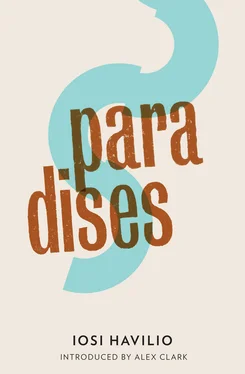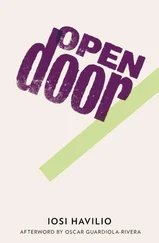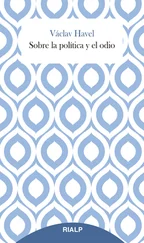Iosi Havilio - Paradises
Здесь есть возможность читать онлайн «Iosi Havilio - Paradises» весь текст электронной книги совершенно бесплатно (целиком полную версию без сокращений). В некоторых случаях можно слушать аудио, скачать через торрент в формате fb2 и присутствует краткое содержание. Год выпуска: 2013, Издательство: And Other Stories, Жанр: Современная проза, на английском языке. Описание произведения, (предисловие) а так же отзывы посетителей доступны на портале библиотеки ЛибКат.
- Название:Paradises
- Автор:
- Издательство:And Other Stories
- Жанр:
- Год:2013
- ISBN:нет данных
- Рейтинг книги:3 / 5. Голосов: 1
-
Избранное:Добавить в избранное
- Отзывы:
-
Ваша оценка:
- 60
- 1
- 2
- 3
- 4
- 5
Paradises: краткое содержание, описание и аннотация
Предлагаем к чтению аннотацию, описание, краткое содержание или предисловие (зависит от того, что написал сам автор книги «Paradises»). Если вы не нашли необходимую информацию о книге — напишите в комментариях, мы постараемся отыскать её.
is an almost perfect novel." — Albert Camus's
reimagined with a female lead in in twenty-first-century Buenos Aires.
Recently widowed, a young woman leaves the countryside for Buenos Aires with her four-year-old son where she seeks to build a new life for herself. She finds work in the zoo and moves into the human zoo of a squatted tower block at the invitation of one of its residents, to whom she acts as nurse, giving morphine injections.
Paradises — читать онлайн бесплатно полную книгу (весь текст) целиком
Ниже представлен текст книги, разбитый по страницам. Система сохранения места последней прочитанной страницы, позволяет с удобством читать онлайн бесплатно книгу «Paradises», без необходимости каждый раз заново искать на чём Вы остановились. Поставьте закладку, и сможете в любой момент перейти на страницу, на которой закончили чтение.
Интервал:
Закладка:
I called you in for something else, he reveals without looking at me, rifling through some papers piled on the desk. Silence. Here it is, he says, and starts reading to himself, running his index finger down the sheet to the rhythm of an electrocardiogram. You arrived in December, it’ll be three months next Monday, won’t it? The thing is that your contract’s going to expire, he wants to know whether I’m aware of that. I lie: Yes, of course. What’s your plan? I shrug, stretch my hands forward to suggest that I intend to keep working. Very well. He twists in his seat and tells me that they’ll offer to renew my contract for another three months. Unfortunately at the moment we can’t talk about you becoming permanent. But you never know, with things the way they are, he says, waggling his thumb. What I can tell you is that, as of next week, you’ll be working in another sector. It’s still to be decided, but they always rotate it fairly. Although he doesn’t say as much, I assume it’s because of the iguana, until the episode is cleared up. I accept without hesitation.
Eloísa tires of being friendly, my silence irritates her: Hey girl, what’s up? I don’t respond to that either. It’s not that I’m annoyed or anything, I just don’t know what to say, how to approach her again. I prefer to stay quiet. She wouldn’t understand me, she gets angry quickly. She sends me half a dozen messages in one afternoon, she goes from When will we see each other? to What’s wrong, bitch? And from there to an unceasing series of insults: Whore, Spoilsport, Fuck-up. UR SICK IN THE HEAD, is the last thing she writes. Then, she disappears.
In spite of herself, Iris has her send-off. Very intimate, Simón and me, no one else. The plane that will take her back to her country leaves at half three in the morning. Cheap flight, she says. The taxi comes to get her at twenty to one. It’s a cool night, the first in a long time. The sky is amazingly clear for the city. I manage to count some twenty stars. We settle in the courtyard of the Fénix under the yellow lamp. Simón cavorts about until he runs out of energy. He goes to sleep by himself, without me having to say anything, suddenly adult. In an unusually good mood, the Spaniard lends us an airbed which we put at the end of the table. The characters passing through the hotel come and go, from the bathroom to the bedrooms, from the kitchen to the hall where the television is. Iris has bought ham, bread, Roquefort and two bottles of black beer.
She says that she went to work today as if it were any other day. She did her double shift, spent the morning in the subtropical jungle and the afternoon at the ticket booth for the sea-lion show. At six she presented herself at human resources to let them know she was leaving. When? she says the unpleasant guy asked her and she couldn’t contain her laughter. We drink several toasts, we recall anecdotes, we laugh as we remember the encounter with Yuri and Olga. In Iris’s room, lined up on the mattress, already sheetless, are the ticket, the passport and a plastic envelope with very colourful banknotes, presumably Romanian. Flowers, national heroes and planets. She gives instructions for me to send her telegram of resignation. I also have to pick up her final wage.
I’m leaving along with the heat, I don’t know whether she’s protesting or saying it with joy. The last goodbye is short, clumsy, almost non-existent. There are no embraces or effusions, just a superficial peck on the cheek. The night takes care of erasing any emotion. Iris opens and closes her hand from inside the taxi, a timid wave, like a diva in decline. See you soon, she says and I repeat as if at a mass: See you soon. The car drives a block and turns the first corner to the right, a brisk swerve that makes the tyres screech. I stay standing at the door of the hotel with Simón in my arms gripping my body with his arms and legs, absorbed in some undefined thought that flees behind Iris until the roar of a motorbike rouses me. The return journey is hell, Simón’s weight tortures my back to an implausible degree.
Thirty-four
I’m going to die today, says Tosca early in the morning. She asks me to move closer, she speaks in my ear so that Benito can’t hear. She crosses her index finger over her lips, making it clear that it’s a secret between me and her. I’m about to respond, to say something that doesn’t come out; I limit myself to arching my eyebrows and squeezing out a smile to reproach her for the thought. I hurry to prepare the syringe, I look for the vein and inject the morphine right to the last drop.
From the world of snakes, I was transferred to the farm. In the open air, unobserved, much more pleasurable. When Yessica found out, she caused a minor row, arguing that she’d asked to change sector a while ago and her seniority should put her before me. I tried to explain that they assigned me without asking, if it were up to me I’d have no problem staying, but it was pointless, she was indignant. Since I moved to my new post, she’s stopped greeting me. There’s been no further mention of the iguana. The subject comes to me every now and then like a ghost and I get it into my head that sooner or later some evidence is going to appear to incriminate me. I wonder whether my judgement day will come.
Working in the farm is very different. There are days when no one comes. Many people avoid the place, probably because it only has ordinary animals they’ve seen before. It’s also true that a short diversion is required to find it, leaving the main path and climbing a ramp. I spend most of my time alone, sitting on a plastic stool under the shade of a straw roof. My companion is a short, heavyset boy, very introverted and fanatical about the job. He definitely prefers dealing with the goats, the donkey and the cow to dealing with humans. To begin with, I struggle to get used to the smell, that mix of dung and fodder that contaminates the air. Now that I’ve grown accustomed to it, sometimes I close my eyes, breathe deeply and smell something potent that fills me with vigour.
Behind the pens there’s an L-shaped construction with barred windows, air conditioning and long tables for packed lunches. Sometimes I go in and spend a few minutes refreshing myself but the relief has its snag: the transition from the cold to the heat makes me dizzy. The really terrible days are when there’s a birthday party. The place becomes an insufferable clamour, which affects the animals’ moods. In some cases they break out and have violent fits: bites, kicks, rebellions. I don’t have to take care of anything, two girls come especially for that, but all the same it’s impossible to block it out. There are unmanageable brats who slip under the fence and find it funny to mount a sheep, pull a pig’s tail, throw stones at hens. Then I do have to intervene. Initially I find it difficult, but I soon become tougher and am able to issue frightening shouts. I see Iris everywhere, I mistake her, I imagine her, in some way I miss her.
One Friday afternoon, I open the flat door and I can’t understand what I’m seeing: Simón is tied to a chair by his feet and hands, round his waist too, secured to the backrest by a rope. I come out of my daze and make a sign with my hand asking him for an explanation but he can’t talk either, in his mouth there’s some cloth, a piece of something. I return to the corridor, I lean out into the stairwell, nothing, my head fills with impossible hypotheses. Simón looks me in the eye, inexpressive, with no trace of suffering, nor does he look like he’s been crying. I want to believe it’s some kind of strange joke, in bad taste, I think about el Buti’s brother’s gang. I walk over to him and the first thing I do is remove what is preventing him from speaking, one of my socks rolled into a ball, and he goes crazy, he shakes his head biting the air, he wants me to block his mouth again. I understand less and less. I ignore him, crouching to free him from his tethers, and he protests loudly. At that moment, Herbert comes out of the bathroom with a plastic bottle filled with water and a green and black slice of pipe, a garden hose. Before he appears, before discovering that I’m here, addressing Simón, he says: Confess, it’s your last chance. The phrase remains unfinished. On seeing me, as well as falling silent, Herbert blushes. I interrogate him in silence, not annoyed, disconcerted. We’re playing, Herbert intercepts me and I slap a leg rehearsing a strike I’m not going to give him. It’s a joke, he says. I’m about to say: This is no game, it doesn’t look like fun, you might hurt yourselves. But Simón’s cries deafen me. Herbert explains the obvious, the inconceivable: He likes being tied up. I stroke Simón’s head, I try to dissuade him but he doesn’t want to hear it, he rejects me, he kicks, he screams like a savage, he unleashes a new fury. That’s what I mean, Herbert insists and raises his shoulders as if saying it’s not his fault, he has nothing to do with someone else’s whims. I move away a few steps, I allow it without being sure, defeated by the circumstances. Simón calms down as Herbert reties his feet and I cease to hear him altogether with the sock between his teeth.
Читать дальшеИнтервал:
Закладка:
Похожие книги на «Paradises»
Представляем Вашему вниманию похожие книги на «Paradises» списком для выбора. Мы отобрали схожую по названию и смыслу литературу в надежде предоставить читателям больше вариантов отыскать новые, интересные, ещё непрочитанные произведения.
Обсуждение, отзывы о книге «Paradises» и просто собственные мнения читателей. Оставьте ваши комментарии, напишите, что Вы думаете о произведении, его смысле или главных героях. Укажите что конкретно понравилось, а что нет, и почему Вы так считаете.











